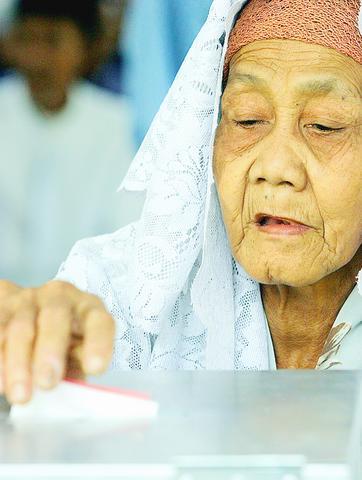Ex-general Susilo Bambang Yud-hoyono is on course for a landslide victory over President Mega-wati Sukarnoputri after Indonesia's presidential election yesterday, according to an early forecast.
Yudhoyono was predicted to win 62 percent of the votes against 38 percent for Megawati, said the Freedom Institute, the Indonesian partner of the respected Washington-based National Democratic Institute (NDI).

PHOTO: EPA
The vote was Indonesia's first direct presidential election and a milestone in its sometimes violent transition to democracy since the fall of dictator Suharto in 1998.
Security was tight for the poll which came 11 days after a suicide bomber killed nine people outside the Australian embassy -- Indonesia's third major Islamic extremist attack in two years.
But the last of three elections this year in the archipelago of 18,000 islands seemed to pass without trouble, another step forward for a country that has often witnessed turbulent transfers of power.
Paul Rowland of the NDI said even though the figures only accounted for about half the sampled votes, the final outcome would not change much.
"Those proportions are probably very accurate," Rowland said.
"Quick counts" produced by the NDI in cooperation with a local group proved extremely accurate in the two earlier elections this year.
A full official count will take weeks as polls from more than 150 million eligible voters are tallied across far-flung islands.
Yudhoyono, 55, has consistently scored nearly double the support for Megawati in opinion polls taken since a July 5 first-round vote that saw the former security minister emerge as frontrunner.
With little to distinguish the candidates' broad policies on economic reform, tackling corruption and improving security, the presidential race has largely become a personality contest favouring Yudhoyono.
He was among the first to vote at a polling station in his village of Cikeas south of Jakarta.
"With the assumption that there will be no violations in the counting of the ballots, I do believe, God willing, that I can win this election," he said, thumbs raised in the air, after casting his vote.
Voting near her private residence in south Jakarta, a typically reticent Megawati arrived several hours after balloting began. Scores of people who turned out to see her were kept waiting.
Asked if she was confident of victory, Megawati only told reporters: "Yes."
Analysts say Yudhoyono's pedigree as an ex-military man, who led operations to capture Islamic extremists blamed for the October 2002 Bali bombings and a strike on Jakarta's Marriott hotel last year, may also have helped his prospects.
Among voters turning out was a frail 83-year old Suharto, who visited a polling station in a Jakarta suburb supported by a walking cane and family members.

A fire caused by a burst gas pipe yesterday spread to several homes and sent a fireball soaring into the sky outside Malaysia’s largest city, injuring more than 100 people. The towering inferno near a gas station in Putra Heights outside Kuala Lumpur was visible for kilometers and lasted for several hours. It happened during a public holiday as Muslims, who are the majority in Malaysia, celebrate the second day of Eid al-Fitr. National oil company Petronas said the fire started at one of its gas pipelines at 8:10am and the affected pipeline was later isolated. Disaster management officials said shutting the

UNREST: The authorities in Turkey arrested 13 Turkish journalists in five days, deported a BBC correspondent and on Thursday arrested a reporter from Sweden Waving flags and chanting slogans, many hundreds of thousands of anti-government demonstrators on Saturday rallied in Istanbul, Turkey, in defence of democracy after the arrest of Istanbul Mayor Ekrem Imamoglu which sparked Turkey’s worst street unrest in more than a decade. Under a cloudless blue sky, vast crowds gathered in Maltepe on the Asian side of Turkey’s biggest city on the eve of the Eid al-Fitr celebration which started yesterday, marking the end of Ramadan. Ozgur Ozel, chairman of the main opposition Republican People’s Party (CHP), which organized the rally, said there were 2.2 million people in the crowd, but

The US government has banned US government personnel in China, as well as family members and contractors with security clearances, from any romantic or sexual relationships with Chinese citizens, The Associated Press (AP) has learned. Four people with direct knowledge of the matter told the AP about the policy, which was put into effect by departing US ambassador Nicholas Burns in January shortly before he left China. The people would speak only on condition of anonymity to discuss details of a confidential directive. Although some US agencies already had strict rules on such relationships, a blanket “nonfraternization” policy, as it is known, has

OPTIONS: Asked if one potential avenue to a third term was having J.D. Vance run for the top job and then pass the baton to him, Trump said: ‘That’s one,’ among others US President Donald Trump on Sunday that “I’m not joking” about trying to serve a third term, the clearest indication he is considering ways to breach a constitutional barrier against continuing to lead the country after his second term ends at the beginning of 2029. “There are methods which you could do it,” Trump said in a telephone interview with NBC News from Mar-a-Lago, his private club. He elaborated later to reporters on Air Force One from Florida to Washington that “I have had more people ask me to have a third term, which in a way is a fourth term